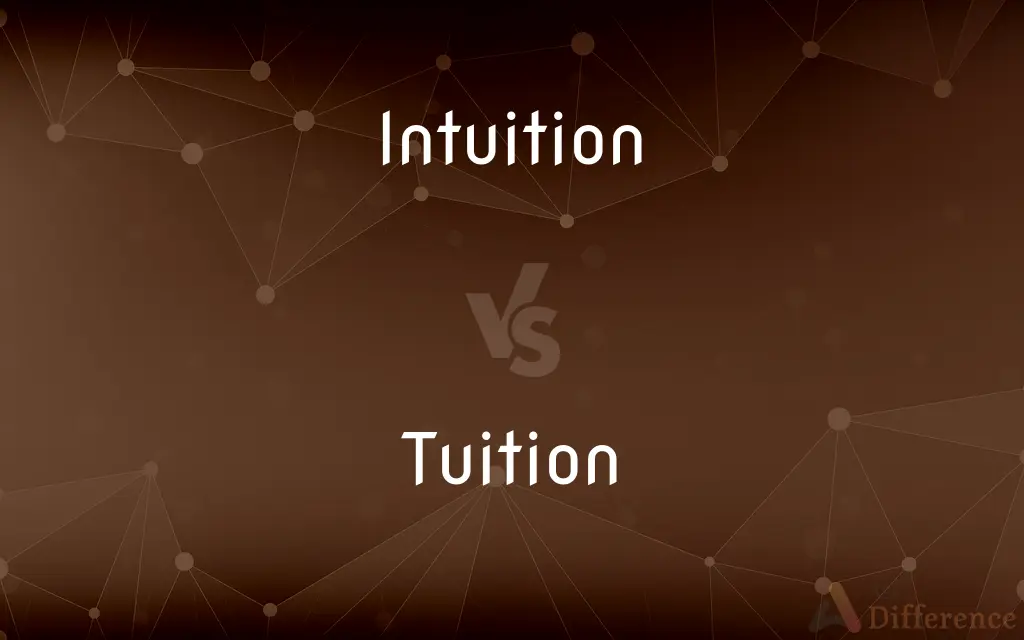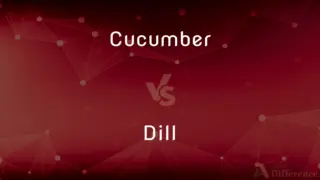Intuition vs. Tuition — What's the Difference?
By Urooj Arif & Maham Liaqat — Updated on April 2, 2024
Intuition involves understanding without evident rational thought, while tuition refers to the fee for instruction at a school or university.

Difference Between Intuition and Tuition
Table of Contents
ADVERTISEMENT
Key Differences
Intuition is a process of understanding or knowing something immediately without the need for conscious reasoning. It's often described as a "gut feeling" or an "instinct" that guides decisions or beliefs without explicit reasoning. On the other hand, tuition is a term used primarily in the context of education, representing the fee charged for instructional services at schools, colleges, or universities. Whereas intuition is an abstract, internal process, tuition is a concrete, external transaction.
While intuition plays a significant role in decision-making and creativity, offering insights without a clear, logical basis, tuition is an economic transaction that enables access to formal education and training. Intuition can influence how someone approaches learning or problem-solving, tapping into subconscious knowledge or experience. Conversely, the cost of tuition can affect access to education, shaping who can afford to attend certain institutions and what resources are available to them.
Intuition is individual and subjective, varying greatly from person to person. It is influenced by one's experiences, biases, and emotions, making it unique to each individual. Tuition, however, is set by educational institutions and is influenced by factors such as location, prestige, and the type of education being provided. While intuition is innate and can be honed over time, tuition rates are determined through policy and financial considerations.
The development of intuition can be seen as an intangible investment in one's personal or professional growth. It can be improved through practices such as mindfulness and experience. In contrast, paying tuition is a tangible investment in education, often seen as a prerequisite for certain careers and opportunities. Both forms of investment aim to enhance one's capabilities but do so through very different means.
Intuition and tuition also differ in how they are valued and assessed. The value of intuition is often recognized in outcomes that are difficult to predict or quantify, such as creative achievements or the ability to navigate complex social dynamics. Tuition, meanwhile, is quantified in financial terms and directly correlates with the perceived quality or demand for certain educational programs. The assessment of intuition is subjective and personal, whereas tuition costs are explicit and require financial planning.
ADVERTISEMENT
Comparison Chart
Definition
Immediate understanding without conscious reasoning
Fee for instructional services at educational institutions
Context
Personal decision-making, creativity
Education, economic transaction
Nature
Abstract, internal
Concrete, external
Influence Factors
Experiences, biases, emotions
Location, institution's prestige, type of education
Role
Guides decisions or beliefs without explicit reasoning
Enables access to formal education
Compare with Definitions
Intuition
Gut Feeling.
He had a strong intuition that he should avoid the shortcut home.
Tuition
Educational Fee.
The tuition for the course was surprisingly affordable.
Intuition
Immediate Perception.
Despite the lack of evidence, her intuition told her the truth was being hidden.
Tuition
School Payment.
Tuition must be paid at the beginning of each semester.
Intuition
Subconscious Insight.
His intuition about people's motives rarely led him astray.
Tuition
Instructional Charge.
Tuition at the university increases by five percent each year.
Intuition
Instinctive Knowledge.
Her intuition about the market trends was uncannily accurate.
Tuition
Cost of Education.
Scholarships help many students cover the cost of tuition.
Intuition
Innate Understanding.
She trusted her intuition when deciding to take the job, feeling it was the right choice.
Tuition
Learning Investment.
They saved for years to pay for their children's tuition.
Intuition
Intuition is the ability to acquire knowledge without recourse to conscious reasoning. Different fields use the word "intuition" in very different ways, including but not limited to: direct access to unconscious knowledge; unconscious cognition; inner sensing; inner insight to unconscious pattern-recognition; and the ability to understand something instinctively, without any need for conscious reasoning.The word intuition comes from the Latin verb intueri translated as "consider" or from the late middle English word intuit, "to contemplate".
Tuition
A fee for instruction, especially at a college, university, or private school.
Intuition
The ability to understand something instinctively, without the need for conscious reasoning
We shall allow our intuition to guide us
Tuition
Instruction; teaching
A musician who was under his tuition for a year.
Intuition
The faculty of knowing or understanding something without reasoning or proof.
Tuition
(Archaic) Guardianship.
Intuition
An impression or insight gained by the use of this faculty
"I had this intuition you would come here just after the rain broke" (Carson McCullers).
Tuition
(North American) A sum of money paid for instruction (such as in a high school, boarding school, university, or college).
These rosemaling workshops are no place for anyone who wants to pester me or the students with the "white privilege" card, inter alia. Therefore, I reserve the right to refund the tuition of such men and women, kick them out the door, and bar them from at least two of my future events.
Intuition
Immediate cognition without the use of conscious rational processes.
Tuition
The training or instruction provided by a teacher or tutor.
Intuition
A perceptive insight gained by the use of this faculty.
Tuition
Paid private classes taken outside of formal education; tutoring. also used attributively
Tuition classes
Intuition
A looking after; a regard to.
What, no reflection on a reward! He might have an intuition at it, as the encouragement, though not the cause, of his pains.
Tuition
(archaic) Care, guardianship.
Intuition
Direct apprehension or cognition; immediate knowledge, as in perception or consciousness; - distinguished from "mediate" knowledge, as in reasoning; as, the mind knows by intuition that black is not white, that a circle is not a square, that three are more than two, etc.; quick or ready insight or apprehension.
Sagacity and a nameless something more, - let us call it intuition.
Tuition
Superintending care over a young person; the particular watch and care of a tutor or guardian over his pupil or ward; guardianship.
Intuition
Any object or truth discerned by intuition.
Tuition
Especially, the act, art, or business of teaching; instruction; as, children are sent to school for tuition; his tuition was thorough.
Intuition
Any quick insight, recognized immediately without a reasoning process; a belief arrived at unconsciously; - often it is based on extensive experience of a subject.
Tuition
The money paid for instruction; the price or payment for instruction; as, tuition must be paid in full before graduation.
Intuition
The ability to have insight into a matter without conscious thought; as, his chemical intuition allowed him to predict compound conformations without any conscious calculation; a mother's intuition often tells her what is best for her child.
Tuition
A fee paid for instruction (especially for higher education);
Tuition and room and board were more than $25,000
Intuition
Instinctive knowing (without the use of rational processes)
Tuition
Teaching pupils individually (usually by a tutor hired privately)
Intuition
An impression that something might be the case;
He had an intuition that something had gone wrong
Common Curiosities
How does intuition work?
It works through subconscious processes, drawing on past experiences and internal cues.
What does tuition cover?
Tuition covers the cost of instruction and sometimes other educational resources at a school or university.
Why is tuition so expensive?
Factors include operational costs of institutions, demand for education, and available resources and facilities.
Are there ways to reduce tuition costs?
Yes, through scholarships, grants, financial aid, and attending less expensive institutions.
What is intuition?
Intuition is an immediate understanding or knowledge without conscious reasoning.
Can intuition be trusted?
While often useful, intuition can be influenced by biases and emotions, so it's not infallible.
Is tuition the same at all schools?
No, tuition varies widely depending on the institution, its location, and the type of program.
Can intuition be wrong?
Yes, because it's influenced by subjective factors and may not always align with logical analysis.
How can someone improve their intuition?
By gaining experiences, practicing mindfulness, and learning to listen to their internal cues.
Does intuition play a role in learning?
Yes, it can influence how one absorbs and interprets information or approaches problems.
How is tuition calculated?
Institutions calculate tuition based on their operational costs, desired profit margin, and market factors.
Can tuition change over time?
Yes, tuition often increases due to inflation and rising operational costs of educational institutions.
How do scholarships impact tuition?
Scholarships can significantly reduce the amount a student needs to pay out of pocket for tuition.
Is intuition the same as instinct?
They are similar, but intuition is more about immediate understanding, while instinct is about inherent behaviors.
What's the difference between tuition fees and other educational expenses?
Tuition fees specifically cover instructional costs, while other expenses may include books, housing, and supplies.
Share Your Discovery

Previous Comparison
Cucumber vs. Dill
Next Comparison
Score vs. WinAuthor Spotlight
Written by
Urooj ArifUrooj is a skilled content writer at Ask Difference, known for her exceptional ability to simplify complex topics into engaging and informative content. With a passion for research and a flair for clear, concise writing, she consistently delivers articles that resonate with our diverse audience.
Co-written by
Maham Liaqat













































